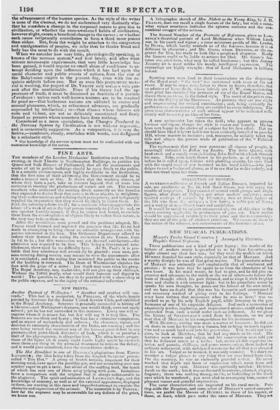FINE ARTS.
THE members of the London Mechanics' Institution met on Monday evening, in their Theatre in Southampton Buildings, to petition the Queen and both Houses of Parliament, that all the monuments and works of art in public building; should be open freely to the public. It is a notable circumstance, and highly creditable to the Institution, that the first time of their addressing the Government should be to make a request such as this. It shows that the working classes, of whom they form a part, take an interest beyond that of mere idle curiosity in viewing the productions of nature and art. The various members who addressed the meeting dwelt earnestly on the benefits they expected to der ive from free access to these objects, in enlighten- ing their understandings and refining their perceptions ; cad indignantly repelled the imputation that they would be likely to injure them. In- deed, the calumny refutes itself; for it inechenic who can appreciate the Lbw. of a work of art is the last person wantonly to deface it : and, as one speaker forcibly argued, if they be coarse and brutal, to exclude them from the contemplation of objects likely to soften their nature, is the very way to keep them so. After the resolutions were passed and the petitions adopted, Mr. Fotroo stood forward and reported the progress that Mr. Hem had made in attempting to bring about an amicable arrangement with the parties interested in the fees. The Ordnance Department offered to reduce their demand for seeing the curiosities in the Tower, from 5s. Cd. to Is. ; but this concession was not deemed satisfactory—the admission was required to be free. This being a Government eata- blishment, there need be nu difficulty here. At St. Paul's it is pro- bable that free admission will eventu ,lly he granted : even now, per- sons entering during service may remain to view the monuments after it is concluded; and the railing that restricted the public to the centre of the building is removed. The Dean of Westminster clutches the fees with the gripe of a miser : but death may soon relax his grasp. The Royal Academy, too, trader-like, will riot give up their shillings. Without the 7,0001. yearly, what would their honours and dignity be worth ? The question is, are they to be provided with a show'-shop at the public expense, and to the injury of the national collection ?


























 Previous page
Previous page